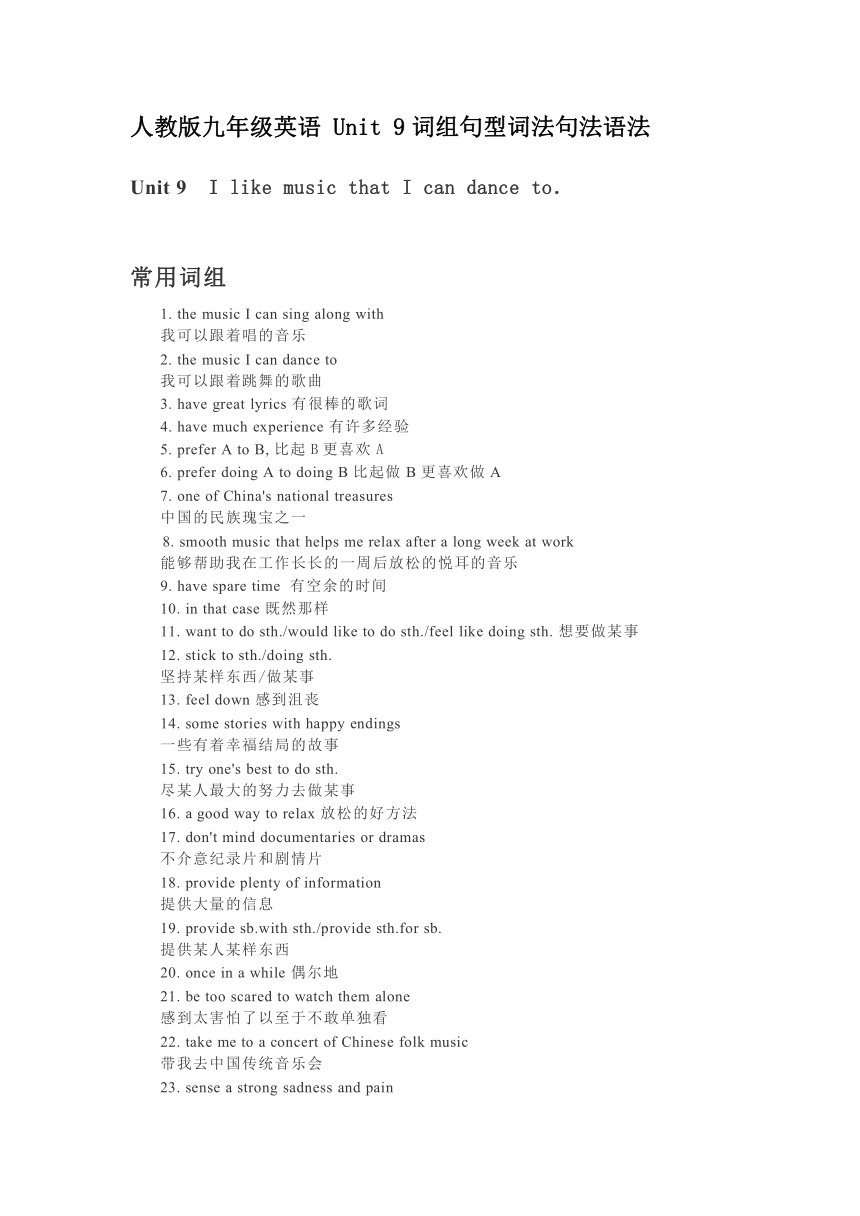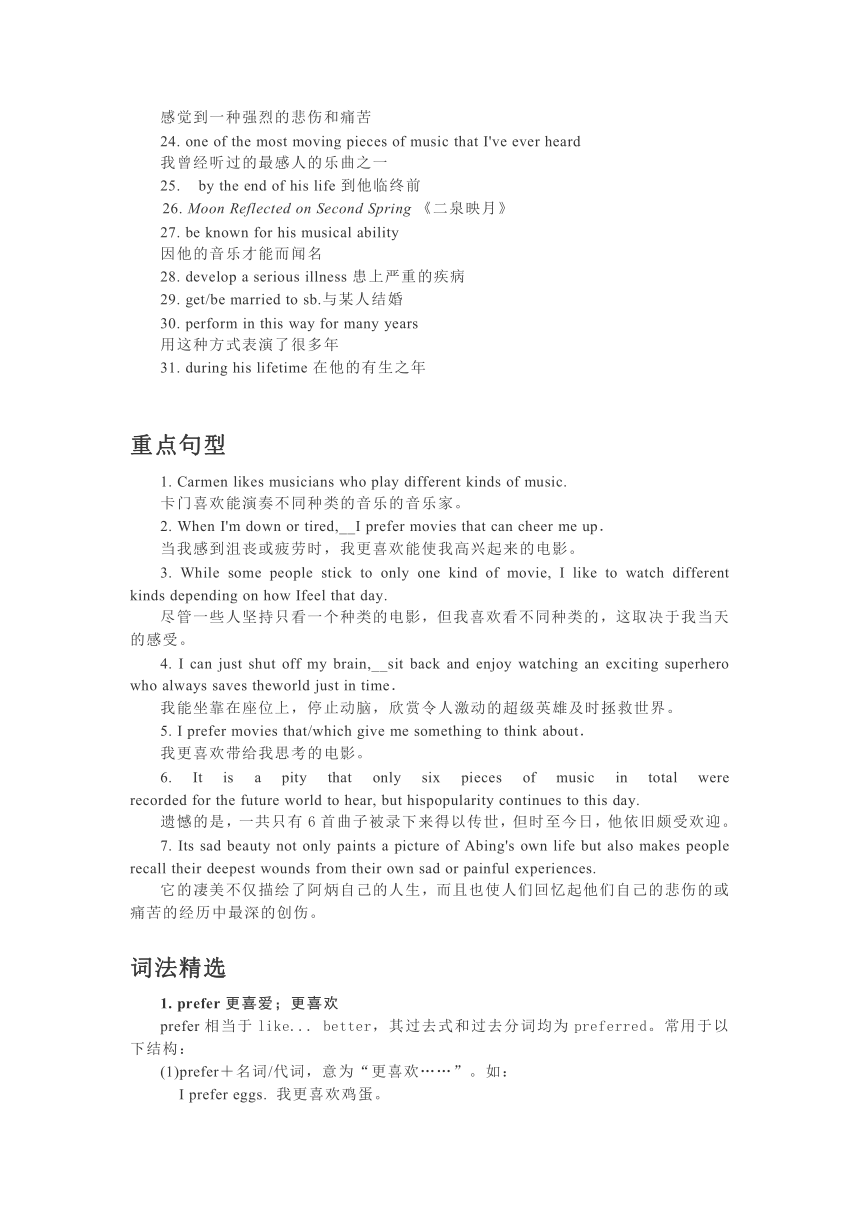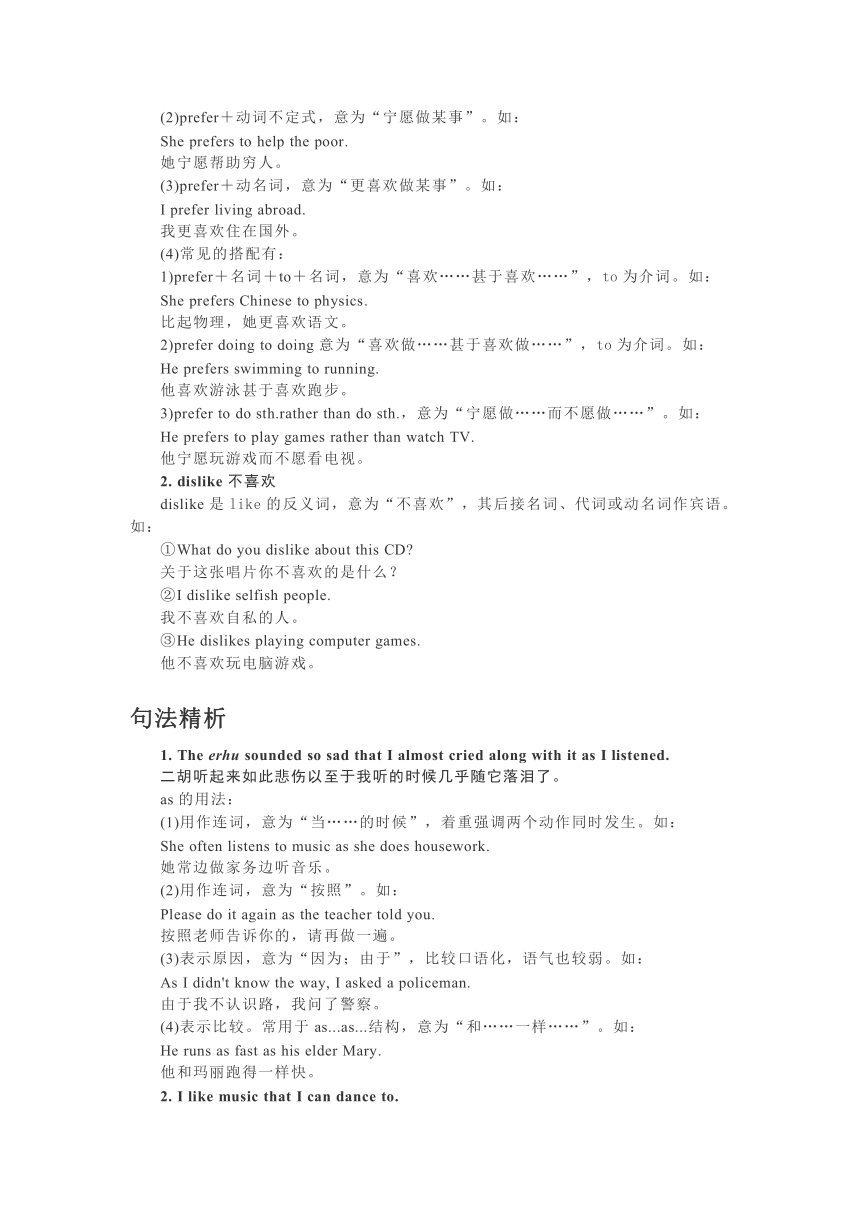Unit 9 I like music that I can dance to.复习学案 词组+句型+词法+句法+语法
文档属性
| 名称 | Unit 9 I like music that I can dance to.复习学案 词组+句型+词法+句法+语法 |  | |
| 格式 | docx | ||
| 文件大小 | 26.5KB | ||
| 资源类型 | 教案 | ||
| 版本资源 | 人教新目标(Go for it)版 | ||
| 科目 | 英语 | ||
| 更新时间 | 2022-01-09 13:39:04 | ||
图片预览



文档简介
人教版九年级英语 Unit 9词组句型词法句法语法
Unit 9 I like music that I can dance to.
常用词组
1. the music I can sing along with
我可以跟着唱的音乐
2. the music I can dance to
我可以跟着跳舞的歌曲
3. have great lyrics 有很棒的歌词
4. have much experience 有许多经验
5. prefer A to B, 比起B更喜欢A
6. prefer doing A to doing B比起做B更喜欢做A
7. one of China's national treasures
中国的民族瑰宝之一
8. smooth music that helps me relax after a long week at work
能够帮助我在工作长长的一周后放松的悦耳的音乐
9. have spare time 有空余的时间
10. in that case 既然那样
11. want to do sth./would like to do sth./feel like doing sth. 想要做某事
12. stick to sth./doing sth.
坚持某样东西/做某事
13. feel down 感到沮丧
14. some stories with happy endings
一些有着幸福结局的故事
15. try one's best to do sth.
尽某人最大的努力去做某事
16. a good way to relax 放松的好方法
17. don't mind documentaries or dramas
不介意纪录片和剧情片
18. provide plenty of information
提供大量的信息
19. provide sb.with sth./provide sth.for sb.
提供某人某样东西
20. once in a while 偶尔地
21. be too scared to watch them alone
感到太害怕了以至于不敢单独看
22. take me to a concert of Chinese folk music
带我去中国传统音乐会
23. sense a strong sadness and pain
感觉到一种强烈的悲伤和痛苦
24. one of the most moving pieces of music that I've ever heard
我曾经听过的最感人的乐曲之一
25. by the end of his life到他临终前
26. Moon Reflected on Second Spring 《二泉映月》
27. be known for his musical ability
因他的音乐才能而闻名
28. develop a serious illness 患上严重的疾病
29. get/be married to sb.与某人结婚
30. perform in this way for many years
用这种方式表演了很多年
31. during his lifetime 在他的有生之年
重点句型
1. Carmen likes musicians who play different kinds of music.
卡门喜欢能演奏不同种类的音乐的音乐家。
2. When I'm down or tired,__I prefer movies that can cheer me up.
当我感到沮丧或疲劳时,我更喜欢能使我高兴起来的电影。
3. While some people stick to only one kind of movie, I like to watch different kinds depending on how Ifeel that day.
尽管一些人坚持只看一个种类的电影,但我喜欢看不同种类的,这取决于我当天的感受。
4. I can just shut off my brain,__sit back and enjoy watching an exciting superhero who always saves theworld just in time.
我能坐靠在座位上,停止动脑,欣赏令人激动的超级英雄及时拯救世界。
5. I prefer movies that/which give me something to think about.
我更喜欢带给我思考的电影。
6. It is a pity that only six pieces of music in total were recorded for the future world to hear, but hispopularity continues to this day.
遗憾的是,一共只有6首曲子被录下来得以传世,但时至今日,他依旧颇受欢迎。
7. Its sad beauty not only paints a picture of Abing's own life but also makes people recall their deepest wounds from their own sad or painful experiences.
它的凄美不仅描绘了阿炳自己的人生,而且也使人们回忆起他们自己的悲伤的或痛苦的经历中最深的创伤。
词法精选
1. prefer更喜爱;更喜欢
prefer相当于like... better,其过去式和过去分词均为preferred。常用于以下结构:
(1)prefer+名词/代词,意为“更喜欢……”。如:
I prefer eggs. 我更喜欢鸡蛋。
(2)prefer+动词不定式,意为“宁愿做某事”。如:
She prefers to help the poor.
她宁愿帮助穷人。
(3)prefer+动名词,意为“更喜欢做某事”。如:
I prefer living abroad.
我更喜欢住在国外。
(4)常见的搭配有:
1)prefer+名词+to+名词,意为“喜欢……甚于喜欢……”,to为介词。如:
She prefers Chinese to physics.
比起物理,她更喜欢语文。
2)prefer doing to doing意为“喜欢做……甚于喜欢做……”,to为介词。如:
He prefers swimming to running.
他喜欢游泳甚于喜欢跑步。
3)prefer to do sth.rather than do sth.,意为“宁愿做……而不愿做……”。如:
He prefers to play games rather than watch TV.
他宁愿玩游戏而不愿看电视。
2. dislike 不喜欢
dislike是like的反义词,意为“不喜欢”,其后接名词、代词或动名词作宾语。如:
①What do you dislike about this CD
关于这张唱片你不喜欢的是什么?
②I dislike selfish people.
我不喜欢自私的人。
③He dislikes playing computer games.
他不喜欢玩电脑游戏。
句法精析
1. The erhu sounded so sad that I almost cried along with it as I listened.
二胡听起来如此悲伤以至于我听的时候几乎随它落泪了。
as的用法:
(1)用作连词,意为“当……的时候”,着重强调两个动作同时发生。如:
She often listens to music as she does housework.
她常边做家务边听音乐。
(2)用作连词,意为“按照”。如:
Please do it again as the teacher told you.
按照老师告诉你的,请再做一遍。
(3)表示原因,意为“因为;由于”,比较口语化,语气也较弱。如:
As I didn't know the way, I asked a policeman.
由于我不认识路,我问了警察。
(4)表示比较。常用于as...as...结构,意为“和……一样……”。如:
He runs as fast as his elder Mary.
他和玛丽跑得一样快。
2. I like music that I can dance to.
我喜欢我能跟着跳舞的音乐。
dance to相当于dance to music,意为“跟着音乐跳舞”,to为介词。如:
They danced to the disco music.
他们跟着迪斯科音乐跳舞。
3. I like music that I can sing along with.
我喜欢我能跟着唱的音乐。
along with意为“伴随……;同……一道”。如:
①I will go along with you.
我将同你一道去。
②I sang along with the electronic music.
我伴随着电子音乐唱歌。
语法精讲
定语从句
定语从句在复合句中作定语,修饰一个名词(短语)或代词,被修饰的名词(短语)或代词被称为先行词。定语从句通常出现在先行词之后,由关系代词(that, which, who, whom, whose)或关系副词(when,where, why)引出。
关系代词的用法
(1)that 既可以用于指人,也可以用于指物。在从句中作主语或宾语,作主语时不可省略,作宾语时可省略。如:
①I prefer music that has great lyrics.
我喜欢有优美歌词的音乐。(that指music,作主语,不能省略,从句的谓语动词根据先行词定单复数,此句的先行词是music,故谓语动词用单数形式has)
②I suppose I'll just listen to the new CD (that) I bought.
我想我就听我买的新唱片。(that指the new CD,作bought的宾语,可以省略)
③Xu Fei prefers groups that play quiet and slow songs.
徐飞更喜欢演奏轻柔缓慢歌曲的组合。(that指groups,作主语,不能省略,从句的谓语动词跟随先行词groups,故谓语动词用复数形式play)
(2)which用于指物,在从句中作主语或宾语,作主语时不可省略,作宾语时可省略。如:
①The magazine (which) you lent me was wonderful.
你借给我的那份报纸很棒。(which指the book,作宾语,可以省略)
②The building which stands near the train station is a supermarket.
位于火车站附近的那座大楼是一家超市。(which指the building,作主语,不能省略)
(3)who, whom用于指人,who用作主语或宾语,whom只用作宾语。如:
①Carmen likes musicians who play different kinds of music.
卡门喜欢演奏不同种类音乐的音乐家。(who指musicians,作主语,不能省略)
②Who is the teacher (whom) Li Ming is talking to
正在与李明谈话的老师是谁?(whom指the teacher,作宾语,可以省略)
【注意】(1)当定语从句中含有介词,介词放在句末时,who, that, which可省略,但介词在关系代词前时,只能用“介词+which/whom”结构。如:
①This is the house in which we lived last year.
这是我们去年居住的房子。
②He is the person with whom the teacher talked with .
他就是和老师谈话的人。
(2)含有介词的固定短语动词中,介词不可前置,只能放在原来的位置上。如:
This is the person whom you are looking for.
这就是你要找的那个人。
(3)that作介词的宾语时,介词不能放在它的前面,只能放在从句中动词的后面。如:
The city that she lives in is very far away.
她居住的城市非常远。
(4)关系代词只能用that,而不用which的情况:
1)先行词被序数词或形容词最高级所修饰,或本身是序数词或形容词最高级时,只能用that。如:
My brother was the first person that had the phone in my family.
我弟弟是我家第一个拥有的人。
2)被修饰的先行词为all, any, much, many, everything, anything, none, the one等不定代词时,只能用that,而不用which。如:
Is there anything that you want to say now
你现在还有什么要说的吗?
3)先行词被the only, the very, the same, the last, little, few等词修饰时,只能用that,而不用which。如:
This is the only question that I want to ask.
这就是我唯一要问的问题。
4)先行词里同时含有人和物时,只能用that,而不用which。如:
I can remember well the persons and some pictures that I saw in the room.
我能清楚记得我在那个房间所见到的人和一些照片。
5)以who或which引导的特殊疑问句,为避免重复,只能用that。如:
①Who is the girl that is crying
正在哭泣的那个女孩是谁?
②Which is the hotel that you like best
哪一家是你最喜欢的酒店?
6)主句是there be结构,修饰主语的定语从句用that,而不用which。如:
There is a book on the desk that belongs to Tom.
桌子上有本汤姆的书。
(5)关系代词只能用which,而不用that的情况:
1)先行词为that, those时,用which,而不用that。如:
What's that which is under the desk
在桌子底下的那个东西是什么?
2)关系代词前有介词时,一般用which,而不用that。如:
This is the room in which he lives.
这是他居住的房间。
3)引导非限制性定语从句,用which,而不用that。如:
Tom came back, which made us happy.
汤姆回来了,这使我们很高兴。
Unit 9 I like music that I can dance to.
常用词组
1. the music I can sing along with
我可以跟着唱的音乐
2. the music I can dance to
我可以跟着跳舞的歌曲
3. have great lyrics 有很棒的歌词
4. have much experience 有许多经验
5. prefer A to B, 比起B更喜欢A
6. prefer doing A to doing B比起做B更喜欢做A
7. one of China's national treasures
中国的民族瑰宝之一
8. smooth music that helps me relax after a long week at work
能够帮助我在工作长长的一周后放松的悦耳的音乐
9. have spare time 有空余的时间
10. in that case 既然那样
11. want to do sth./would like to do sth./feel like doing sth. 想要做某事
12. stick to sth./doing sth.
坚持某样东西/做某事
13. feel down 感到沮丧
14. some stories with happy endings
一些有着幸福结局的故事
15. try one's best to do sth.
尽某人最大的努力去做某事
16. a good way to relax 放松的好方法
17. don't mind documentaries or dramas
不介意纪录片和剧情片
18. provide plenty of information
提供大量的信息
19. provide sb.with sth./provide sth.for sb.
提供某人某样东西
20. once in a while 偶尔地
21. be too scared to watch them alone
感到太害怕了以至于不敢单独看
22. take me to a concert of Chinese folk music
带我去中国传统音乐会
23. sense a strong sadness and pain
感觉到一种强烈的悲伤和痛苦
24. one of the most moving pieces of music that I've ever heard
我曾经听过的最感人的乐曲之一
25. by the end of his life到他临终前
26. Moon Reflected on Second Spring 《二泉映月》
27. be known for his musical ability
因他的音乐才能而闻名
28. develop a serious illness 患上严重的疾病
29. get/be married to sb.与某人结婚
30. perform in this way for many years
用这种方式表演了很多年
31. during his lifetime 在他的有生之年
重点句型
1. Carmen likes musicians who play different kinds of music.
卡门喜欢能演奏不同种类的音乐的音乐家。
2. When I'm down or tired,__I prefer movies that can cheer me up.
当我感到沮丧或疲劳时,我更喜欢能使我高兴起来的电影。
3. While some people stick to only one kind of movie, I like to watch different kinds depending on how Ifeel that day.
尽管一些人坚持只看一个种类的电影,但我喜欢看不同种类的,这取决于我当天的感受。
4. I can just shut off my brain,__sit back and enjoy watching an exciting superhero who always saves theworld just in time.
我能坐靠在座位上,停止动脑,欣赏令人激动的超级英雄及时拯救世界。
5. I prefer movies that/which give me something to think about.
我更喜欢带给我思考的电影。
6. It is a pity that only six pieces of music in total were recorded for the future world to hear, but hispopularity continues to this day.
遗憾的是,一共只有6首曲子被录下来得以传世,但时至今日,他依旧颇受欢迎。
7. Its sad beauty not only paints a picture of Abing's own life but also makes people recall their deepest wounds from their own sad or painful experiences.
它的凄美不仅描绘了阿炳自己的人生,而且也使人们回忆起他们自己的悲伤的或痛苦的经历中最深的创伤。
词法精选
1. prefer更喜爱;更喜欢
prefer相当于like... better,其过去式和过去分词均为preferred。常用于以下结构:
(1)prefer+名词/代词,意为“更喜欢……”。如:
I prefer eggs. 我更喜欢鸡蛋。
(2)prefer+动词不定式,意为“宁愿做某事”。如:
She prefers to help the poor.
她宁愿帮助穷人。
(3)prefer+动名词,意为“更喜欢做某事”。如:
I prefer living abroad.
我更喜欢住在国外。
(4)常见的搭配有:
1)prefer+名词+to+名词,意为“喜欢……甚于喜欢……”,to为介词。如:
She prefers Chinese to physics.
比起物理,她更喜欢语文。
2)prefer doing to doing意为“喜欢做……甚于喜欢做……”,to为介词。如:
He prefers swimming to running.
他喜欢游泳甚于喜欢跑步。
3)prefer to do sth.rather than do sth.,意为“宁愿做……而不愿做……”。如:
He prefers to play games rather than watch TV.
他宁愿玩游戏而不愿看电视。
2. dislike 不喜欢
dislike是like的反义词,意为“不喜欢”,其后接名词、代词或动名词作宾语。如:
①What do you dislike about this CD
关于这张唱片你不喜欢的是什么?
②I dislike selfish people.
我不喜欢自私的人。
③He dislikes playing computer games.
他不喜欢玩电脑游戏。
句法精析
1. The erhu sounded so sad that I almost cried along with it as I listened.
二胡听起来如此悲伤以至于我听的时候几乎随它落泪了。
as的用法:
(1)用作连词,意为“当……的时候”,着重强调两个动作同时发生。如:
She often listens to music as she does housework.
她常边做家务边听音乐。
(2)用作连词,意为“按照”。如:
Please do it again as the teacher told you.
按照老师告诉你的,请再做一遍。
(3)表示原因,意为“因为;由于”,比较口语化,语气也较弱。如:
As I didn't know the way, I asked a policeman.
由于我不认识路,我问了警察。
(4)表示比较。常用于as...as...结构,意为“和……一样……”。如:
He runs as fast as his elder Mary.
他和玛丽跑得一样快。
2. I like music that I can dance to.
我喜欢我能跟着跳舞的音乐。
dance to相当于dance to music,意为“跟着音乐跳舞”,to为介词。如:
They danced to the disco music.
他们跟着迪斯科音乐跳舞。
3. I like music that I can sing along with.
我喜欢我能跟着唱的音乐。
along with意为“伴随……;同……一道”。如:
①I will go along with you.
我将同你一道去。
②I sang along with the electronic music.
我伴随着电子音乐唱歌。
语法精讲
定语从句
定语从句在复合句中作定语,修饰一个名词(短语)或代词,被修饰的名词(短语)或代词被称为先行词。定语从句通常出现在先行词之后,由关系代词(that, which, who, whom, whose)或关系副词(when,where, why)引出。
关系代词的用法
(1)that 既可以用于指人,也可以用于指物。在从句中作主语或宾语,作主语时不可省略,作宾语时可省略。如:
①I prefer music that has great lyrics.
我喜欢有优美歌词的音乐。(that指music,作主语,不能省略,从句的谓语动词根据先行词定单复数,此句的先行词是music,故谓语动词用单数形式has)
②I suppose I'll just listen to the new CD (that) I bought.
我想我就听我买的新唱片。(that指the new CD,作bought的宾语,可以省略)
③Xu Fei prefers groups that play quiet and slow songs.
徐飞更喜欢演奏轻柔缓慢歌曲的组合。(that指groups,作主语,不能省略,从句的谓语动词跟随先行词groups,故谓语动词用复数形式play)
(2)which用于指物,在从句中作主语或宾语,作主语时不可省略,作宾语时可省略。如:
①The magazine (which) you lent me was wonderful.
你借给我的那份报纸很棒。(which指the book,作宾语,可以省略)
②The building which stands near the train station is a supermarket.
位于火车站附近的那座大楼是一家超市。(which指the building,作主语,不能省略)
(3)who, whom用于指人,who用作主语或宾语,whom只用作宾语。如:
①Carmen likes musicians who play different kinds of music.
卡门喜欢演奏不同种类音乐的音乐家。(who指musicians,作主语,不能省略)
②Who is the teacher (whom) Li Ming is talking to
正在与李明谈话的老师是谁?(whom指the teacher,作宾语,可以省略)
【注意】(1)当定语从句中含有介词,介词放在句末时,who, that, which可省略,但介词在关系代词前时,只能用“介词+which/whom”结构。如:
①This is the house in which we lived last year.
这是我们去年居住的房子。
②He is the person with whom the teacher talked with .
他就是和老师谈话的人。
(2)含有介词的固定短语动词中,介词不可前置,只能放在原来的位置上。如:
This is the person whom you are looking for.
这就是你要找的那个人。
(3)that作介词的宾语时,介词不能放在它的前面,只能放在从句中动词的后面。如:
The city that she lives in is very far away.
她居住的城市非常远。
(4)关系代词只能用that,而不用which的情况:
1)先行词被序数词或形容词最高级所修饰,或本身是序数词或形容词最高级时,只能用that。如:
My brother was the first person that had the phone in my family.
我弟弟是我家第一个拥有的人。
2)被修饰的先行词为all, any, much, many, everything, anything, none, the one等不定代词时,只能用that,而不用which。如:
Is there anything that you want to say now
你现在还有什么要说的吗?
3)先行词被the only, the very, the same, the last, little, few等词修饰时,只能用that,而不用which。如:
This is the only question that I want to ask.
这就是我唯一要问的问题。
4)先行词里同时含有人和物时,只能用that,而不用which。如:
I can remember well the persons and some pictures that I saw in the room.
我能清楚记得我在那个房间所见到的人和一些照片。
5)以who或which引导的特殊疑问句,为避免重复,只能用that。如:
①Who is the girl that is crying
正在哭泣的那个女孩是谁?
②Which is the hotel that you like best
哪一家是你最喜欢的酒店?
6)主句是there be结构,修饰主语的定语从句用that,而不用which。如:
There is a book on the desk that belongs to Tom.
桌子上有本汤姆的书。
(5)关系代词只能用which,而不用that的情况:
1)先行词为that, those时,用which,而不用that。如:
What's that which is under the desk
在桌子底下的那个东西是什么?
2)关系代词前有介词时,一般用which,而不用that。如:
This is the room in which he lives.
这是他居住的房间。
3)引导非限制性定语从句,用which,而不用that。如:
Tom came back, which made us happy.
汤姆回来了,这使我们很高兴。
同课章节目录
- Unit 1 How can we become good learners.
- Section A
- Section B
- Unit 2 I think that mooncakes are delicious!
- Section A
- Section B
- Unit 3 Could you please tell me where the restroom
- Section A
- Section B
- Unit 4 I used to be afraid of the dark.
- Section A
- Section B
- Unit 5 What are the shirts made of?
- Section A
- Section B
- Review of Units 1-5
- Unit 6 When was it invented?
- Section A
- Section B
- Unit 7 Teenagers should be allowed to choose their
- Section A
- Section B
- Unit 8 It must belong to Carla.
- Section A
- Section B
- Unit 9 I like music that I can dance to.
- Section A
- Section B
- Unit 10 You're supposed to shake hands.
- Section A
- Section B
- Review of Units 6-10
- Unit 11 Sad movies make me cry.
- Section A
- Section B
- Unit 12 Life is full of the unexpected
- Section A
- Section B
- Unit 13 We're trying to save the earth!
- Section A
- Section B
- Unit 14 I remember meeting all of you in Grade 7.
- Section A
- Section B
- Review of Units 11-14
